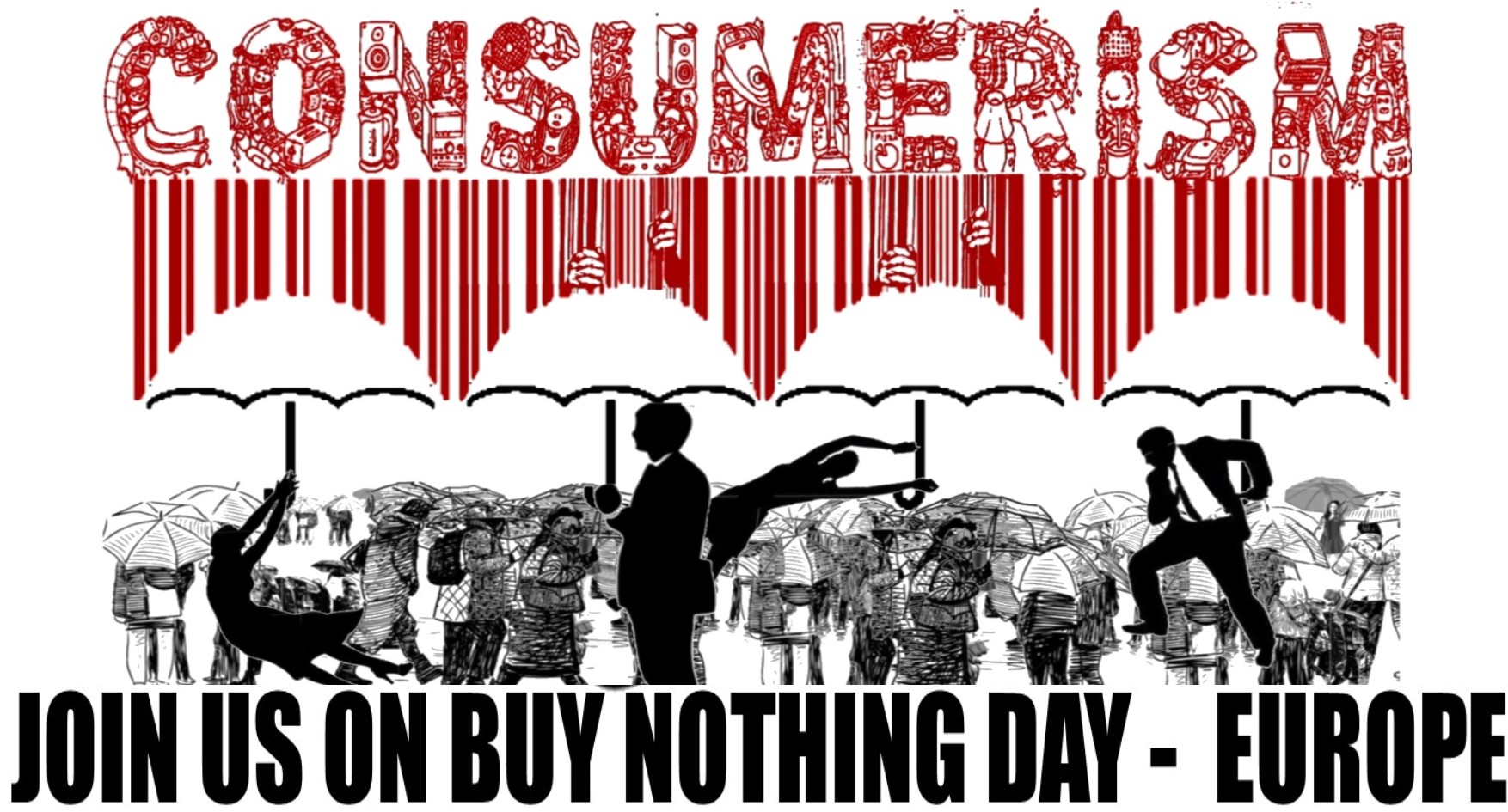Buy Nothing Day – VS – Black Friday
Buy Nothing Day is an international day of protest against consumerism that takes place on November 29th, 2019. It is celebrated on the same day as “Black Friday”, a consumption record every year!
- 77% of people around the world know what Black Friday is, and 47% is willing to participate in the shopping spree this year.
- Shoppers around the world will spend on average 167€ during Black Friday sales, with clothes, electronics and shoes on mind.
 ©black-friday.global
©black-friday.global
The consumption related to Black Friday is increasing every year and the event is lasting longer and longer (now the duration is actually of about a week long). Companies are pushing more and more people into over-consumption.
Electronics are the second favourite products targeted on Black Friday: smartphones, laptops and other ICT products are bought all over the world. This puts a strong pressure on both the environment and the workers of both assembly factories and metal mines where the elements composing electronic devices are extracted (mostly metals). To extract the elements composing the ICT devices bought on black Friday human rights are violated, people’s health is affected and nature is being polluted by the ICT industry.
The extraction of metals always entails major social and environmental impacts and fuel conflicts. In factories, workers have to assemble the products for long hours and are forced into working nights at peaks of orders such as Black Friday. Some migrants’ workers are even obligated to remain at the factory by employers who confiscate their passports for blackmailing purposes. Once the products are out of use, they become e-waste. According to the World Economic Forum, each year more than 50 million tons of e-waste is produced worldwide and only 20% is properly recycled (35% in the European Union). The situation is predicted to get worse in the coming years if we do not reduce our consumption of electronic devices, learn to repair them, share them and recycled them when their life is really over.
 ©World Economic forum
©World Economic forum
The economic system in which we live and the big international companies that rule it created our never-ending urge to consume more and more, especially ICT devices. This way of living is completely unsustainable and puts our planet under serious pressure.
What can we do?
Buy Nothing day – Europe is not only about changing our consumption habits for a few hours, we need to become conscious consumers.
 Improving our way of life and consumption habits is necessary if we want to maintain life on Earth: consuming less and producing less waste is crucial in this fight.
Improving our way of life and consumption habits is necessary if we want to maintain life on Earth: consuming less and producing less waste is crucial in this fight.
Instead of consuming, we stand for repairing, refurbishing, reusing, recycling, sharing and reducing our consumption (more info here). And this consumption we try to redirect towards locally owned, community-based businesses to somewhat diminish our impact.
Let’s ask ourselves the right questions: Do we really need that new gadget or the latest version of our favourite smartphone brand? Why would we buy a new product if we still have one that works? If our favourite ICT device is broken, how can we fix it ourselves? Are there companies that sell products that are easily repairable and recyclable? Why not buy second-hand?
Consumers are not the only responsible for the situation, together we can reach out to companies and the industry to oblige them to produce products in a more sustainable and fair way.
Join us on Buy Nothing Day – Europe and help us spread the message, we can be more than passive consumers.
From fellow responsible consumers…
The countdown is OVER!!!
The Make ICT Fair Project
This campaign is part of the Make ICT Fair project that wants to improve the lives and livelihoods for workers and communities associated with ICT supply chains, particularly in the Global South. Through research, awareness raising, lobbying towards public institutions for more sustainable and fair public procurement policies on ICT and lobbying for better legislation within the EU, the partners try to reach that goal. More information about the project you can find here.
The partners: CATAPA, CEE Bankwatch, Electronics Watch, ICLEI, Le Monde Diplomatique, People & Planet, SETEM Catalunya, Südwind, Swedwatch, Towards Sustainability Action, University of Edinburgh

This project is organis ed with the financial assistance of the European Union. The contents of this publication is the sole responsibility of the Make ICT Fair project and can under no circumstances be regarded as reflecting the position of the European Union.
ed with the financial assistance of the European Union. The contents of this publication is the sole responsibility of the Make ICT Fair project and can under no circumstances be regarded as reflecting the position of the European Union.


